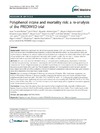Please use this identifier to cite or link to this item:
https://accedacris.ulpgc.es/jspui/handle/10553/19147
| Title: | Polyphenol intake and mortality risk: a re-analysisof the PREDIMED trial | Authors: | Tresserra-Rimabu, Anna Rimm, Eric B. Medina-Remón, Alexander Martínez-González, Miguel Ángel López-Sabater, M. Carmen Covas, María Isabel Corella, Dolores Salas-Salvadó, Jordi Gómez-Gracia, Enrique Lapetra, José Arós, Fernando Fiol, Miquel Ros, Emilio Serra-Majem, Lluis Pinto, Xavier Muñoz, Miguel-Angel Gea, Alfredo Ruiz-Gutierrez, V. Estruch, Ramón Lamuela-Raventós, R.M. |
UNESCO Clasification: | 3206 Ciencias de la nutrición | Keywords: | Mediterranean Diet Polyphenol Intake All-Cause Mortality Predimed Stilbenes, et al |
Issue Date: | 2014 | Journal: | BMC Medicine | Abstract: | Background: Polyphenols may lower the risk of cardiovascular disease (CVD) and other chronic diseases due to their antioxidant and anti-inflammatory properties, as well as their beneficial effects on blood pressure, lipids and insulin resistance. However, no previous epidemiological studies have evaluated the relationship between the intake of total polyphenols intake and polyphenol subclasses with overall mortality. Our aim was to evaluate whether polyphenol intake is associated with all-cause mortality in subjects at high cardiovascular risk.Methods: We used data from the PREDIMED study, a 7,447-participant, parallel-group, randomized, multicenter, controlled five-year feeding trial aimed at assessing the effects of the Mediterranean Diet in primary prevention of cardiovascular disease. Polyphenol intake was calculated by matching food consumption data from repeated food frequency questionnaires (FFQ) with the Phenol-Explorer database on the polyphenol content of each reported food. Hazard ratios (HR) and 95% confidence intervals (CI) between polyphenol intake and mortality were estimated using time-dependent Cox proportional hazard models.Results: Over an average of 4.8 years of follow-up, we observed 327 deaths. After multivariate adjustment, we found a 37% relative reduction in all-cause mortality comparing the highest versus the lowest quintiles of total polyphenol intake (hazard ratio (HR) = 0.63; 95% CI 0.41 to 0.97; P for trend = 0.12). Among the polyphenol subclasses, stilbenes and lignans were significantly associated with reduced all-cause mortality (HR = 0.48; 95% CI 0.25 to 0.91; P for trend = 0.04 and HR = 0.60; 95% CI 0.37 to 0.97; P for trend = 0.03, respectively), with no significant associations apparent in the rest (flavonoids or phenolic acids).Conclusions: Among high-risk subjects, those who reported a high polyphenol intake, especially of stilbenes and lignans, showed a reduced risk of overall mortality compared to those with lower intakes. These results may be useful to determine optimal polyphenol intake or specific food sources of polyphenols that may reduce the risk of all-cause mortality. | URI: | https://accedacris.ulpgc.es/handle/10553/19147 | ISSN: | 1741-7015 | DOI: | 10.1186/1741-7015-12-77 | Source: | BMC Medicine [EISSN 1741-7015], v. 12 (1), Article number 77, (Mayo 2014) | Rights: | by-nc-nd |
| Appears in Collections: | Artículos |
SCOPUSTM
Citations
167
checked on Jun 8, 2025
WEB OF SCIENCETM
Citations
170
checked on Mar 1, 2026
Page view(s)
204
checked on Jan 15, 2026
Download(s)
146
checked on Jan 15, 2026
Google ScholarTM
Check
Altmetric
Share
Export metadata
Items in accedaCRIS are protected by copyright, with all rights reserved, unless otherwise indicated.
